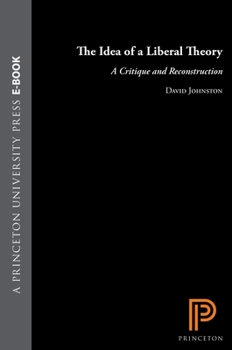The Idea of a Liberal Theory: A Critique and Reconstruction
Select Format
Select Condition 
Book Overview
Liberalism, the founding philosophy of many constitutional democracies, has been criticized in recent years from both the left and the right for placing too much faith in individual rights and distributive justice. In this book, David Johnston argues for a reinterpretation of liberal principles he contends will restore liberalism to a position of intellectual leadership from which it can guide political and social reforms. He begins by surveying the three major contemporary schools of liberal political thought--rights-based, perfectionist, and political liberalism--and, by weeding out their weaknesses, sketches a new approach he calls humanist liberalism. The core of Johnston's humanist liberalism is the claim that the purpose of political and social arrangements should be to empower individuals to be effective agents. Drawing on and modifying the theories of John Rawls, Michael Walzer, Ronald Dworkin, Joseph Raz, Amartya Sen, and others, Johnston explains how this purpose can be realized in a world in which human beings hold fundamentally different conceptions of the ends of life. His humanist liberalism responds constructively to feminist, neo-Marxist, and other criticisms while remaining faithful to the core values of the liberal tradition.
Format:Paperback
Language:English
ISBN:069102913X
ISBN13:9780691029139
Release Date:July 1996
Publisher:Princeton University Press
Length:216 Pages
Weight:0.70 lbs.
Dimensions:0.5" x 7.8" x 10.0"
Customer Reviews
0 rating





